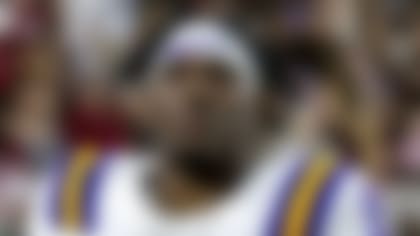PHILADELPHIA -- For more than a year, Chip Kelly's program has been illustrated and chronicled through a string of fast-paced practices, protein shakes, sleep cycles and video game statistics.
But to his boss -- Philadelphia Eagles owner Jeffrey Lurie -- the best way to sum up the Kelly Difference comes with a story that involves a guy who might have trouble telling you if a football is puffed or stuffed.
In May, legendary New Zealand All Blacks coach Graham Henry visited Eagles headquarters. Lurie read his book. Kelly wanted to bring him in. So football innovator and rugby icon (Henry has been knighted in his home country) spent a day talking shop. And Kelly, Lurie and everyone else finished that day better for the experience, even without much time spent on zone blocking or two-gapping or play clock management.
"It's a total preparation to compete, that's what the All Blacks are about, that's why they've won multiple championships," Lurie said Tuesday, from a small office inside Lincoln Financial Field. "It's an unbelievable story. We had a lot to learn from them. I think there's a humbleness to it, too. We're still learning. And Chip's still learning. And all the people around him are still learning."
Football can be complicated, but the larger point Lurie is trying to make here is pretty easy to digest, as simple as the reason he sees for his coach's success: Kelly's program isn't about scheme or system, so much as it is about challenging norms and seeking insight.
The way Lurie sees it, now 18 months in, Kelly has taken the lead in an organizational evolution that demands buy-in and is already producing returns on those investments. As is the case with just about everyone else, the "blur" offense is what drew the owner's attention to the coach, all the way back when Kelly was offensive coordinator at New Hampshire. But what later captivated Lurie -- and convinced him to pursue Kelly after initially being turned down -- is about much more.
And that, Lurie says, is in full bloom all over the building now.
"I think we're sort of an ongoing think tank here," he explained. "We're very open, and I hope humble, to what a lot of people are doing across a lot of sports. And we're just beginning. It's a young team. We haven't accomplished anything yet. We just hope -- as Chip says, 'Win The Day' -- to be better tomorrow than today, and hope to be better this year than last year."
That desire for improvement was central to Lurie and the Eagles' pursuit of Kelly in the first place.
Despite Andy Reid's stumbles late in his Eagles tenure, his shoes would be daunting ones for any coach to fill. So the search centered on guys who could take a good situation and make it better. At Oregon, Kelly followed Mike Bellotti who, similar to Reid, was the winningest coach in that program's history. At a place that was already cutting edge, Kelly pushed the envelope on innovation.
The idea was that he'd do the same in Philly, which is exactly what's happened. Everything -- from scheme to conditioning to nutrition to sleep to camaraderie -- revolves around finding a way to hit peak performance when it matters most.
The players buy in, as far as I can tell, for three reasons. First, they have input, all the way down to the system and game plan, which creates that investment. Second, Kelly always gives them the "why" when giving direction. Third, the results routinely speak for themselves in the performance on the field.
"He has a very full-scale vision of winning big, and it involves preparing players, preparing them in every possible way to reach peak performance," Lurie said. "A lot of it has to do with camaraderie. A lot of it has to do with their own personal nutrition, training. All the sports science stuff, it's real. But he also assembles people, whether it's coaches, players, to work well together. The whole is greater than the sum of all the individual parts, but he wants every individual player to be extremely well prepared and trained."
Last year, LeSean McCoy kept his weight within a four-pound range (210-213), carried the ball more than he ever had and produced career numbers. DeMeco Ryans said at the end of the season that he felt like he normally would in October. And Nick Foles broke through at quarterback, simultaneously shattering the commonly held notion that Kelly needs a fleet-footed signal-caller to make his offense work.
Each was given a plan by Kelly. They followed it, and the results came next.
"He wants to supply everything he can to make players better," Lurie said. "Who are the players that are gonna make the most of that? If you've got some guys who don't value that, who are you kidding yourself with? You gotta surround yourself with people that want to be great. It's hard to describe in a few words. It's more of a total program. ... It's a lot of commitment. He asks a lot, and it's to benefit them. It's a great test of who wants to maximize their own potential.
"If you do, how can you not love the situation?"
Lurie's excitement is rooted, in part, in the direction he sees his franchise heading. He has a young general manager (Howie Roseman), a young president (Don Smolenski), a respected, rising personnel exec (Tom Gamble), and a coach who sets an impressive tone in his stable.
Back during the hiring process, Lurie says, the Eagles told their candidates, "Look, we want to pick someone who has the capability to be here for the next 10, 15 years." That's how they saw Kelly then. That's how they see him now.
Lurie was straightforward in saying he envisions Kelly having a run of Reid-like length in Philly, which would be pretty remarkable in today's football environment. And more than just the organization's desire for long-term stability, that thought is grounded in what he sees in his coach.
"I got the feeling he was capable of that," Lurie said. "People will learn about themselves. Coaches will learn. Do they want to stay in the same place? Do they want to move around? You can't control that. But he has the ability to develop a program that was already successful, and make it even better. They were successful (at Oregon). We had all that success (with Reid). But we want to be better than we were, not stay the same."
Clearly, that goes for Kelly, too.
Three and out from Eagles camp:
1) That investment that the players have in the program? As linebacker Connor Barwin explained it to me, Kelly had to effect a culture change last year. This time around, the players are carrying the torch for him, to some degree, which means being involved on all facets of the operation. That's why I found this quote particularly interesting from the coach, on what he liked about free-agent addition Malcolm Jenkins, a former defensive captain of the Saints: "I think he's done a great job with our staff of asking a lot of interesting questions in terms of, 'Hey, maybe we can fit it this way,' as opposed to the way we are fitting it. I think he's really fit in, I think maybe better than anybody on our staff thought he was going to fit in." That Kelly's first thought was to mention a player's willingness to question the way things work says a lot about the way the Eagles operate.
2) I spoke with offensive coordinator Pat Shurmur about Foles' progress, and he was quick to point out that the team put up great numbers even when it was losing games. So despite Foles' 27:2 touchdown-to-interception ratio, he still has areas to improve. The good thing, Shurmur said, is Foles has "a beginner's mentality. He works hard every day, he's very honest about when he makes mistakes (and) he can make the corrections and move on." A couple players have pointed out that Foles is more willing to take chances in practice now that he's entrenched as the starter, unlike last year. So that could impact his game. But the big hurdle ahead for Foles, according to Shurmur, is building chemistry with new pass catchers Jordan Matthews, Darren Sproles and Josh Huff, as well as Jeremy Maclin, who tore his ACL last year while the quarterback competition was still in progress. It's also worth mentioning that Foles' backup, the much-maligned Mark Sanchez, has impressed the coaches.
3) The Eagles played 3-4 and 4-3 defensive fronts last year, as coordinator Billy Davis worked on transitioning his players to the Steelers-style front that he came up around. With a year under the players' belts, and another offseason of personnel moves in the books, look for the Eagles to go to a two-gap 3-4 scheme on a full-time basis in 2014. What should help in that transition is an infusion of depth at outside linebacker -- a vital position in any Pittsburgh type of defense -- and in the secondary.
Follow Albert Breer on Twitter @AlbertBreer.












